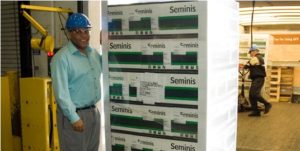Our statement on the protests in Haiti.
On May 13, Monsanto announced a donation of conventional corn and vegetable seeds to farmers in Haiti, to help increase food production and aid long-term earthquake recovery. A small group, utilizing online media, protested. At first they claimed Monsanto was donating genetically modified seed. Then they backed off and attacked the donation of hybrid seed. Then they claimed it was some kind of effort to slip GM seed into the country.
Imaginative, yes. Accurate, no.
Our donation of hybrid seed to Haiti is about farmers, people and food.
Haiti’s farmers need good quality seed, because the better the seed, the better the chances for more food from the same land.
Haiti’s people need food — better quality food, more food and more nutritious food.
We learned in Malawi that a donation of hybrid seed turned a region from a food aid recipient to a food exporter. Malawi farmers were given a chance to show what they could do with good seed. And they did it.
Haiti’s farmers can do the same thing.
That’s what the protesters aren’t saying.
We’ve been asked:
Who approved the donation?
The Haitian Ministry of Agriculture approved our donation and the United States Agency for International Development-funded WINNER project will provide in-country distribution to Haitian farmers. The seed varieties were determined in consultation with Haitian Ministry of Agriculture and are suited for Haiti’s growing conditions.
How much hybrid seed is involved?
The first shipment of more than 60 tons of corn and vegetable seeds arrived in Haiti in May and has already been distributed. Our donation will put seed in the hands of farmers this season to help address food security needs. Further donation of up to an additional 345 tons of corn seed is anticipated over the next 12 months.

But I ask you, what is the genetic make-up of these seeds? Are they modified?
Here in Haiti, we are accustomed to being lied to and tricked by people trying to act like they are doing something to help, but really- they are helping themselves and taking credit for a good deed that was actually a selfish act to serve themselves.
The only question is: Can the farmers produce seed stock from this to continue to grow without being dependent on purchase of more seed from Monsanto? (legitimate considering Monsanto’s known history in this regard) If not, its a bad deal.